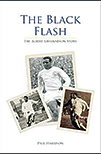 The Albert Johanneson story
The Albert Johanneson story
by Paul Harrison
Vertical, £15.99
Reviewed by Ashley Clark
From WSC 306 August 2012
Paul Harrison’s The Black Flash attempts, through a combination of autobiography, oral history and the author’s own observation, to unspool the tragic tale of Albert Johanneson. The South African-born Leeds United forward endured racism on and off the field, became the first black footballer to play in an FA Cup final (in 1965), and eventually succumbed to alcoholism and an early death in 1995.
The meat of this frequently depressing but compelling book is comprised of large chunks of unexpurgated testimony from Johanneson, framed by explanatory passages from Harrison. It is at its best when its subject’s voice is at the forefront.
Johanneson, looking back on his life following the collapse of his career, paints a vividly evocative picture of his youth in a divided South Africa, where racist violence was commonplace and police were viewed as little more than “paid killers”.
Johanneson was scouted and offered the opportunity to play in England but as soon as he stepped off the plane he was branded a “nigger” by a passerby at London Airport. Though team-mates Billy Bremner and Grenville Hair looked out for him, and he found a friend in fellow black South African Gerry Francis, the impression is of a lonely, shy soul thrown to the wolves.
It is harrowing to read about the constant abuse Johanneson received. It is not difficult to imagine how the deep psychological scars from this continued mistreatment might have contributed to his eventual fate.
Though Harrison is clearly reluctant to demonise his Leeds heroes – including Don Revie, who comes across as a cold bully – The Black Flash paints a grim picture of a wider footballing community who hadn’t the first idea how to engage seriously with the pressures faced by Johanneson.
Sadly, the book is beset by structural problems. Harrison is inclined to interject with his own largely irrelevant opinions on the state of modern football and subjects such as political correctness. Key elements of Johanneson’s experience (his marriage, divorce, descent into alcoholism and early death) are sprinted through in a matter of mere pages toward the book’s conclusion.
Though obtaining information must have been difficult – Johanneson was essentially a homeless drunk by the time of his death – and the man’s wishes not to discuss his family should be respected, the book feels as though it is missing a sizeable, vital element.
There is also a conspicuous lack of attention to detail. In one particularly flagrant case, a significant passage of Johanneson’s testimony is repeated twice within the space of 16 pages. The Black Flash feels like it has missed out on a final edit.
Despite its flaws, the books is a worthwhile, instructive and often shocking read, especially in the context of a challenging year for football, when racism has once again made headlines. Harrison’s decency and commitment shine through in a tale that adds flesh to the bones of the story of a key figure in British football history – a man who slipped through the cracks, but helped to pave the way for future black footballers.